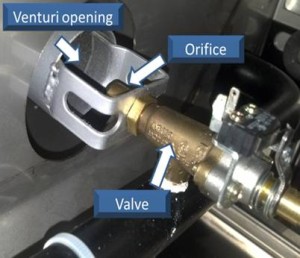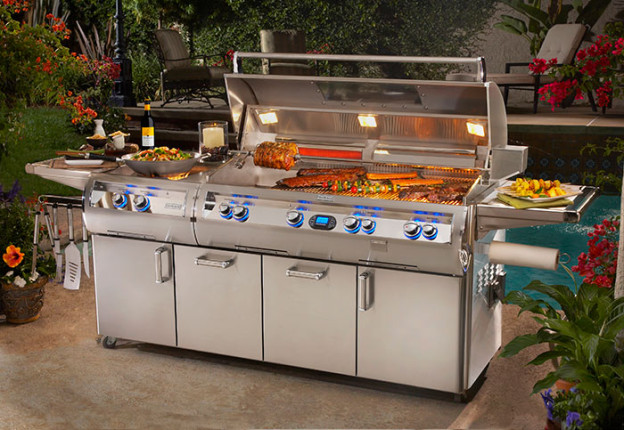Grilling season is just around the corner! Get your gas grill ready to fire up for the summer with four simple tips from Fine’s Gas on how to clean your grill.
Maintaining your grill, especially if it has been sitting all winter, is an important part of extending the lifetime of your grill and ensuring that you continue to get the same great flavor and cooking ability. Inexpensive charcoal grills or tabletop grills will inevitably have some wear and tear overtime, but a quality stainless steel gas grill can last a lifetime with the right care.
Save yourself some time and headaches by following these simple steps before you fire up the grill:
1. Remove spider webs from gas valve openings.
 Spiders love propane. Especially in winter, spiders will spin webs inside gas valve openings because they are attracted to propane gas. These webs can create a potential hazard as well as impact the utility of your grill. Be sure to clean all around these areas to get rid of any webs to ensure smooth flow of gas to your burners.
Spiders love propane. Especially in winter, spiders will spin webs inside gas valve openings because they are attracted to propane gas. These webs can create a potential hazard as well as impact the utility of your grill. Be sure to clean all around these areas to get rid of any webs to ensure smooth flow of gas to your burners.
Covering your gas grill after use and during off seasons can help deter spiders and other insects from nesting in your grill. If you need a grill cover, we sell covers for many of the leading brands, including AOG grills, Broilmaster, and more.
Steps to Remove Spider Webs:
• Take out cooking grates, briquette trays and burners.
• Inspect the venture opening and orifice for any signs or spiders or webbing.
• Use a small wire or straightened paper clip to clear out any other obstacles. If the blockage will not come out, you may have to remove the orifice with a ½ inch deep socket to clear the blockage.
• Check all burner ports for blockage from cooking debris and grease. Use the paper clip and poke through any ports that appear to be blocked or restricted. Do not do this step if you have ceramic ProSear burners or damage may occur.
2. Clean out the grill firebox.
Debris, grease and other substances can build up over time inside your grill and impact your gas grill’s cooking ability. To prep your grill for the season, remove the grates and check the inside of the grill to remove any build-up.
3. Check all hoses and fittings for wear and tear.
Your outdoor kitchen relies on your gas supply to light the burners and cook – ensuring that your gas hoses and fittings have no leaks or tears is integral to efficient and effective use. Make sure all gas fittings and hoses are tightly secured and free of any wear and tear.
Inspect closely for cracks and abrasions, and test your fittings for leaks by applying a solution of 1:3 dish soap and water to all connections. If bubbles form when the soapy solution is applied, it could indicate a gas leak. These must be repaired or replaced prior to using your grill. Contact your local gas grill retailer or the experts at Fine’s Gas for advice on repairing fittings and hoses.
4. Check all wiring connections for frayed or chewed areas.
Rodents love to chew on wiring, and they will often strip the plastic to use in their nests. Check where the wires are connected to the transformer. If you notice signs of chewing, you will need to order a new transformer for your grill. To avoid damage, you may want to store the transformer insider when your grill is sitting idle for some time.


